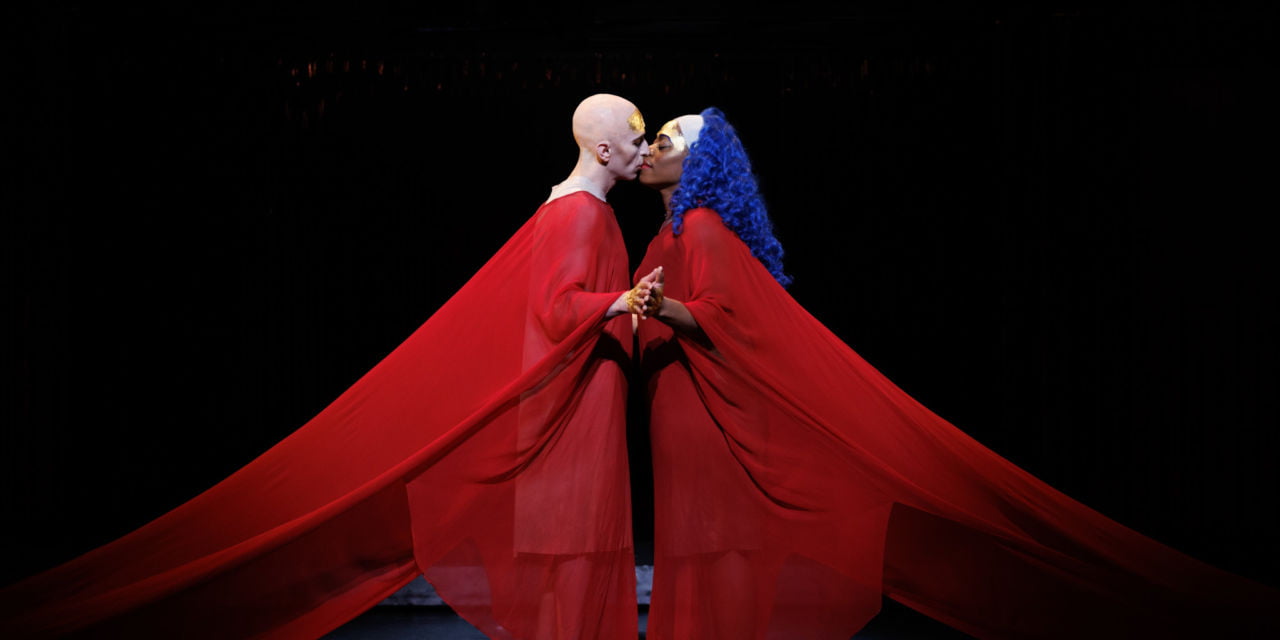Philip Glass’s Akhnaten tells the story of the rise and fall of the Egyptian pharaoh Amenhotep IV, although ‘represents’ maybe a better description as the opera doesn’t have much in the way of plot or sung dialogue.
Changing his name to Akhnaten, the pharaoh abandoned Egypt’s traditional polytheism for a monotheistic religion centred on Aten, an aspect of the sun god Ra. This doomed him to obscurity, with his name expunged from the record and his monuments destroyed following his death. It was only with the 19th century discovery of the city he had built to glorify Aten that he was restored to history.
This production recognises that – bookending the opera with scenes of the discovery of Akhnaten’s mummified corpse and the turning of that corpse into a museum exhibit, in a clever recreation of the pharaoh’s coronation scene. The coronation itself contrasts nicely with that opening scene in which tweed-and-white-coated amateur Egyptologists celebrate their discovery of the lifeless husk that is Akhnaten’s body, by bringing him back to glorious existence.
The story, such as it is, is mostly related in spoken English, by the Scribe, here played by American bass Zachary James, a role he also undertook in 2018. It’s a part he plays with great authority and gravity. His words are delivered with power and clarity.
The main cast is small, with three three principal characters – Akhnaten, his wife Queen Nefertiti and his mother Queen Tye – complemented by just nine others: General Horemhab, the High Priest of Amon, Nefertiti’s father Aye, and Akhnaten’s six daughters.
Joining them on stage is a large chorus as well as the Gandini Juggling Company. The former was in fine voice on the night I attended. The members of the latter are dressed as living usabti, figurines that were places in Egyptian tombs to act as servants to the deceased. They provide a kinetic counterpoint to the music, their juggling balls a physical representation of the sun.
The production is directed by Phelim McDermott, in the second revival of his 2016 staging that premiered at the Coliseum. It’s stunning, with huge sets that make the most of the space available, and spectacular costumes. Special mention must go to Tom Pye, as set designer, and Keven Pollard, for the costumes.
As Akhnaten, American countertenor Anthony Roth Costanzo reprises a role he has now played on several occasions. His acting is superb – something that is noteworthy in this opera of minimalist voice and much stylised movement. His singing is also superb, his voice somehow both powerful and delicate, conveying a vulnerability that is fully played out in the pharaoh’s demise.
His duet with American mezzo-soprano Chrystal E Williams’s Nefertiti is particularly moving. South Korean soprano Haegee Lee as Queen Tye is also outstanding. A former Jette Parker young artist, she is making her ENO debut here.
Glass’s multilayered pulsating score is beautifully brought to life by conductor Karen Kamensek. She handles the ENO Orchestra with great assurance. Under Kamensek’s baton, the music is smooth with a lightness of touch and a feeling of restrained urgency.
This is event theatre at its best. A spectacular production with a massive chorus and yet a feeling of intimacy conveyed by its small main cast. A testament to why we need the English National Opera.
Performances run to 5 April. However, they’re currently all sold out. It’s worth checking ENO’s website for returns. Otherwise, make a note to see the next revival – which is surely inevitable.
Image
The love duet between Pharaoh Akhnaten (Anthony Roth Costanzo) and his beloved wife Queen Nefertiti (Chrystal E Williams) is a highlight of this revival of Phelim McDermott’s staging of Philip Glass’s Akhnaten (Belinda Jiao).

